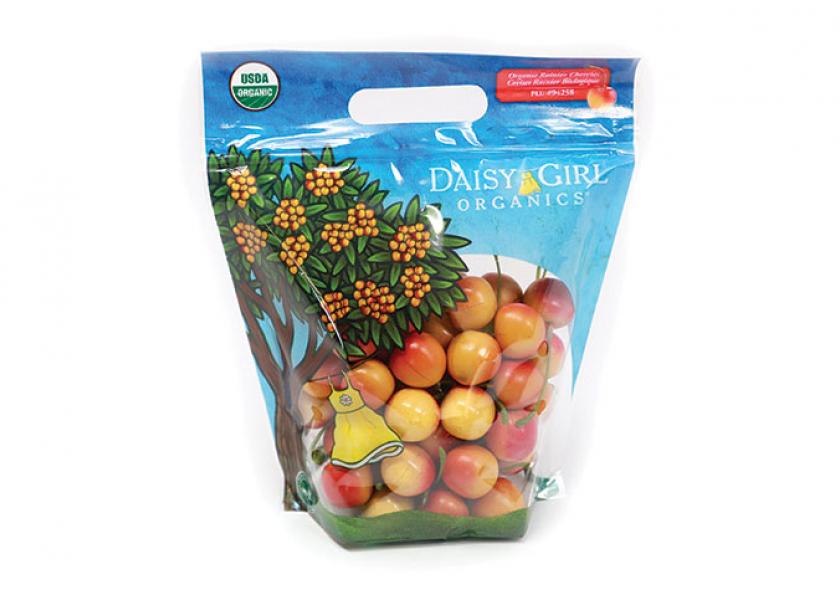Suppliers see organics as key niche in Northwest cherry season

Organics are a relatively tiny part — about 2% — of the Northwest cherry deal, but they play a key role, said B.J. Thurlby, president of the Yakima, Wash.-based Northwest Cherry Growers, an association that includes about 2,500 growers from the region among its membership.
“We kind of grow as demand for organic grows,” he said.
That demand is there, he said.
“Two percent of 23 million is still 700,000-800,000 boxes, so that’s a lot of fruit,” he said.
Organics are a small percentage of the Northwest cherry crop, because cherries are difficult to grow organically, but there are growers devoted to the category, said Brianna Shales, communications manager with Wenatchee, Wash.-based Stemilt Growers LLC.
She cited Stemilt’s Kyle Mathison as an example.
“He grows organically and has modern skeena plantings that come off the tree during July’s peak organic window,” Shales said of Mathison.
“Organic cherries still have promotional opportunities, and retailers should follow the crop closely to make the most of the opportunity when it is there.”
Related content: Organic produce updates
The organic cherry category is growing, if at its own pace, and retailers are aware of it, said Chuck Sinks, president of sales and marketing with Yakima, Wash.-based Sage Fruit Co.
“Organic cherries have been gaining steam each season, and there looks to be good supplies this coming year,” he said.
“While the percentage of organics compared to conventional cherries is small, most retailers feel it is beneficial to offer both SKUs (stock-keeping units) to their customers. Retailers will be able to load organics with conventional to help reduce the need to make multiple pickups this season.”
Last season’s Nielsen sales numbers should convince retailers to carry organic cherries, said Catherine Gipe-Stewart, communications manager at Yakima-based Domex Superfresh Growers.
“As with all fruit, it is more important than ever for retailers to include organics in their cherry programs,” she said, noting that Nielsen reported organic dark sweet sales were up 4%.
“They represent a small portion of total cherry sales, but we know customers who seek them tend to spend more on groceries. And increasingly, customers expect to find organic cherries at their favorite grocery destination.”
Vancouver, British Columbia-based The Oppenheimer Group doesn’t grow organic cherries at its Orchard View Farms operation in The Dalles, Ore., but the category does garner the company’s interest, said Jon Bailey, sales manager.
“We do see it as an area with a high-growth potential in the future, as the industry continues to build on this promising niche,” he said.
“I’m sure that it will continue to grow in volume, although I don’t think it will be a big percentage of the entire supply for several years yet. Controlling certain pests and the economics, along with possible fruit quality and size issues, has kept us from seriously looking at adding it to our manifest, but we continue to monitor the option annually.”
Related content: Northwest cherry news and updates
Chelan, Wash.-based Chelan Fresh Marketing estimates its 2020 organic cherry crop at around 40,000-50,000 boxes, compared to a total cherry volume of about 3.5 million, said Kevin Stennis, organic manager.
“Demand usually outpaces supply on the organic cherries, so it was a good season last year,” he said. “They had good, firm f.o.b.s — kind of what you hope for every year.”
Wenatchee-based CMI Orchards has roughly 12% of the total Northwest organic cherry crop, said Danelle Huber, marketing specialist.
“CMI is lucky to have orchards in some excellent growing regions where we can assure the quality and sweetness of our organic crop,” she said, noting that the company’s Daisy Girl organic label is popular among consumers.
Organic growth can snowball, said Blaine Markley, director of domestic sales with Selah, Wash.-based Rainier Fruit Co..
“The good news is, the more positive experiences and availability for organic products that consumers find, the more their repeat purchases grow,” she said.
“This is increasingly important as consumers are making choices about health and selecting products that fit their lifestyle and values.”
Consumers don’t overlook the health issue, Markley said.
“As a whole, cherry consumption is very stable, but as more consumers lean into health trends, they are looking to cherries for their wide range of health benefits including reducing risks of cardiovascular disease and hypertension,” she said.
“Cherries are also an excellent source of vitamin C, potassium and melatonin. Although cherries have always been an out-of-hand snack, this move to health and wellness has consumers exploring so many more ingredient uses in salads, instant oats, smoothie bowls and other on-trend recipes.”
Related articles:
Northwest cherry suppliers predict busy retail season
Making the leap to organic produce
Northwest cherry grower-shippers anticipate ample volumes







